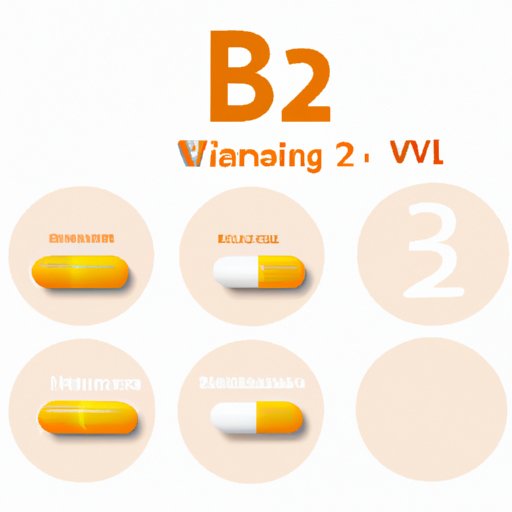
Introduction
Vitamin B12 is an essential nutrient that plays a crucial role in maintaining a healthy body. It is one of the eight B vitamins and has numerous benefits for the body, including better brain function and increased energy levels. As it is not naturally produced in the body, it is important to obtain vitamin B12 through diet or supplements. In this article, we will explore what Vitamin B12 is good for and why it is essential for maintaining optimal health.
The Benefits of Vitamin B12: From Energy Boosts to Better Brain Function
Vitamin B12 has numerous benefits for the body, including:
- Increased Energy Levels: Vitamin B12 is essential for converting the food we eat into energy. It helps in the formation of red blood cells that carry oxygen throughout the body, thereby preventing fatigue.
- Better Brain Function: Low levels of Vitamin B12 are associated with impaired brain function, including memory loss and difficulty in concentration. It is also linked to an increased risk of Alzheimer’s disease in the elderly.
- Healthy Nervous System: Vitamin B12 is crucial for the normal functioning of the nervous system. It helps in the production of myelin, which is a fatty substance that insulates nerve fibers and speeds up the transmission of nerve impulses.
- Reduced Risk of Heart Disease: Studies have shown that Vitamin B12 can help lower levels of homocysteine, an amino acid that is linked to an increased risk of heart disease.
- Healthy Skin and Hair: Vitamin B12 plays a role in cell reproduction and the growth of healthy skin and hair.
Why You Need Vitamin B12: Exploring Its Role in Maintaining a Healthy Body
Vitamin B12 is essential for maintaining a healthy body. It is involved in numerous bodily functions, including:
- Red Blood Cell Production: Vitamin B12 is essential for the formation of red blood cells. Without it, the body will produce larger and fewer red blood cells, leading to anemia.
- Nerve Function: Vitamin B12 plays a crucial role in the functioning of the nervous system. A deficiency in Vitamin B12 can lead to nerve damage and neurological symptoms such as numbness, tingling, and difficulty walking.
- DNA Synthesis: Vitamin B12 is essential for the synthesis of DNA, which is necessary for cell division and growth.
- Energy Production: As mentioned, Vitamin B12 helps in the conversion of food into energy by aiding in the absorption of other B vitamins.
The Surprising Benefits of Vitamin B12 for Vegans and Vegetarians
Vitamin B12 is predominantly found in animal-based foods, which can make it difficult for vegans and vegetarians to obtain adequate amounts through their diet. It is recommended that individuals following a plant-based diet take Vitamin B12 supplements or consume fortified foods, such as plant milks and breakfast cereals. Some of the benefits of Vitamin B12 for vegans and vegetarians include:
- Prevents Deficiency: As individuals following a plant-based diet may not obtain sufficient amounts of Vitamin B12 through their diet, supplementation can prevent deficiency and the associated health problems.
- Improved Brain Function: Studies have shown that individuals following a plant-based diet who supplement with Vitamin B12 have improved brain function and memory.
- Reduced Risk of Osteoporosis: Low levels of Vitamin B12 are associated with an increased risk of osteoporosis, particularly in those following a plant-based diet.
Vitamin B12: A Key Component of a Balanced Diet and Essential for Optimal Health
Vitamin B12 is a key component of a balanced diet and essential for optimal health. Deficiency in Vitamin B12 can lead to numerous health problems, including fatigue, anemia, and impaired brain function. It is therefore important to obtain sufficient amounts of Vitamin B12 through diet or supplements.
How Much Vitamin B12 Do You Need? A Comprehensive Guide to Its Functions and Benefits
The recommended daily intake of Vitamin B12 varies depending on age and individual health conditions. The following are the recommended daily intakes for different age groups:
- Infants (0-6 months): 0.4 mcg
- Infants (7-12 months): 0.5 mcg
- Children (1-3 years): 0.9 mcg
- Children (4-8 years): 1.2 mcg
- Children (9-13 years): 1.8 mcg
- Teens (14-18 years): 2.4 mcg
- Adults: 2.4 mcg
- Pregnant women: 2.6 mcg
- Breastfeeding women: 2.8 mcg
Individuals with specific health conditions such as gastrointestinal disorders or those following a plant-based diet may require higher amounts of Vitamin B12 and should consult their healthcare provider.
Conclusion
Vitamin B12 is essential for maintaining optimal health. It has numerous benefits for the body, including better brain function, increased energy levels, and reduced risk of certain health conditions. As Vitamin B12 is not naturally produced in the body, it is important to obtain sufficient amounts through diet or supplements. Individuals following a plant-based diet or those with specific health conditions may require higher amounts of Vitamin B12 and should consult their healthcare provider.




